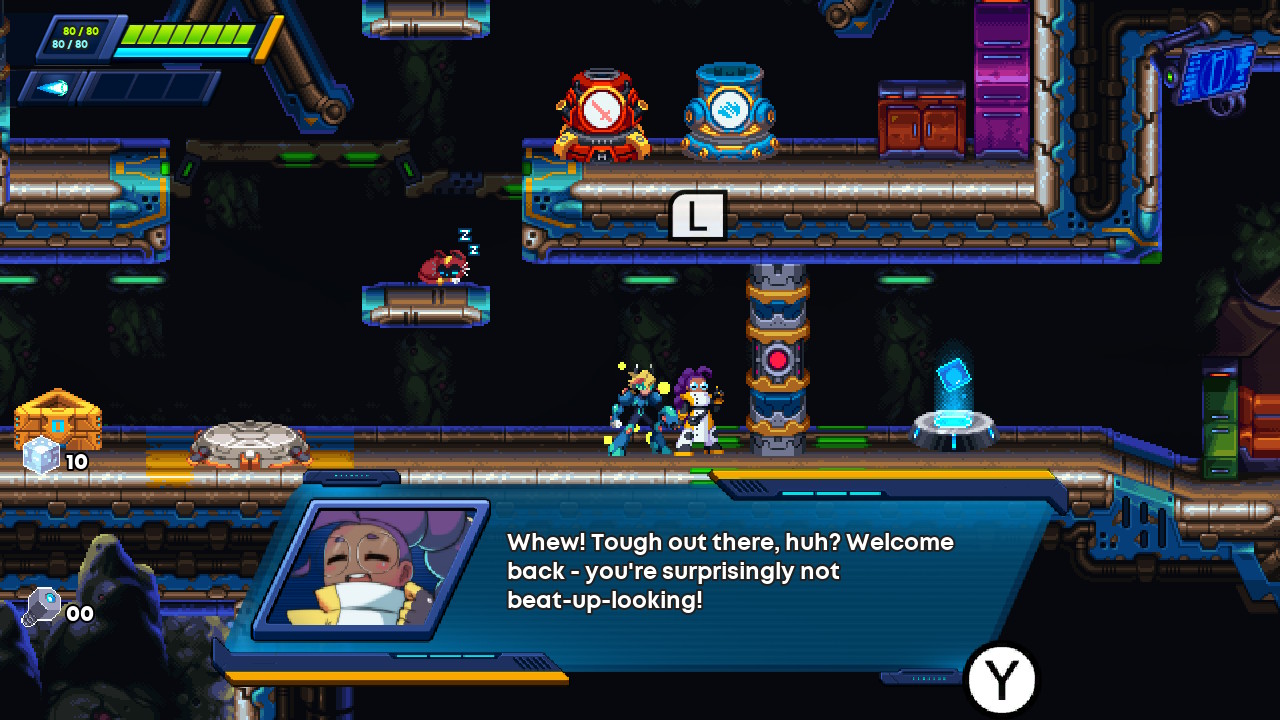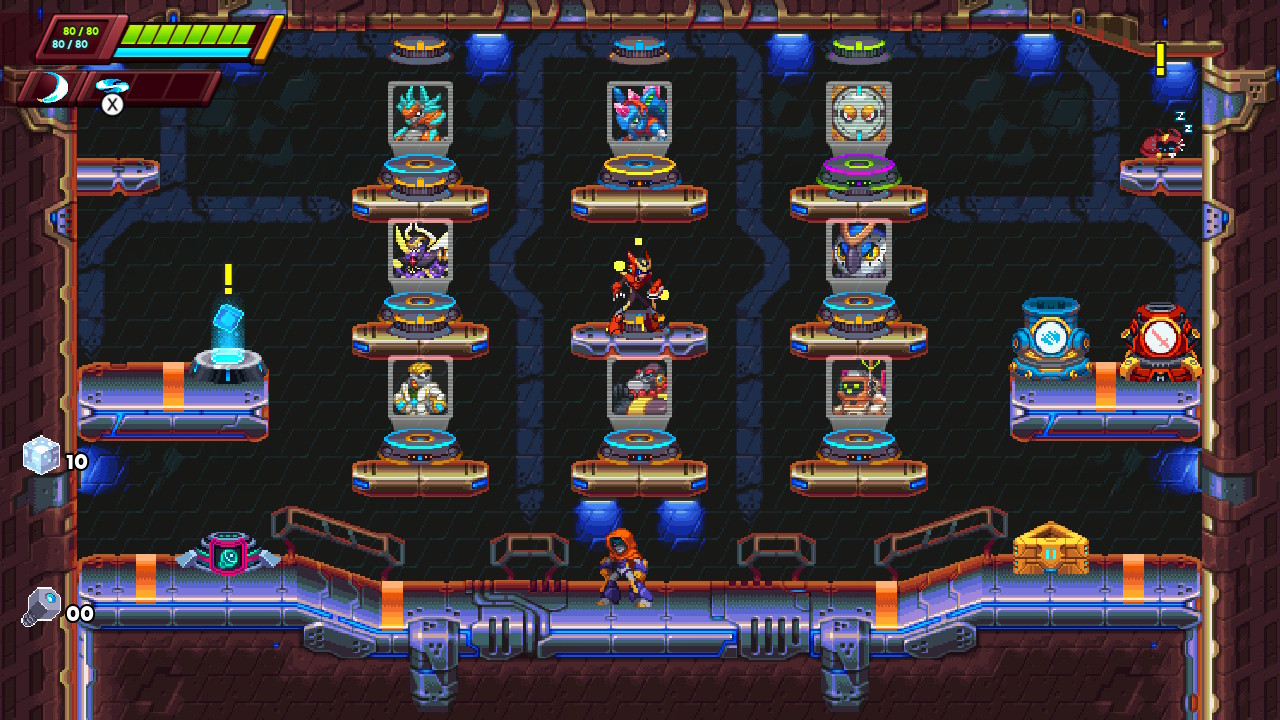System: Switch
Release date: August 24, 2023
Developer: Colorgrave
Publisher: Colorgrave
It would be fair to say that while Capcom hasn’t entirely abandoned the Mega Man franchise, it has been somewhat lax with support for it within recent times, favoring collective releases of past series rather than making entirely new games. It has fallen to smaller studios to carry the torch and deliver new experiences, and Battery Staple Games has risen to the occasion magnificently with 30XX, a follow-up to their previous take on the formula.
30XX is a side-scrolling action platformer that sees you running, jumping, blasting, and slashing your way through procedurally generated levels, which culminate in a boss battle. While the game is clearly heavily inspired by the Mega Man X series (to the point that the two main characters are essentially X and Zero in both appearance and play style) it also incorporates roguelite elements, as death will see you returned to HQ where you can spend resources accumulated throughout your runs for permanent upgrades to your character.
It’s a gameplay loop that any who have played a roguelite will be familiar with, although as far as roguelites go 30XX is on the less generous side with its resource accumulation than its peers, and the focus is less on building your character up to the point that you can blitz through levels and more on honing your skills through repeated attempts. Unless you’re particularly skilled at action platformers with a much heavier emphasis on platforming you may find your progression to be on the slower side: this is a game that demands speed and precision, and in standard mode at least you won’t be afforded the luxury of learning the layout of a level, as each time you enter you’ll be presented with a fresh set of challenges to overcome.

Thankfully character animations are smooth and fluid throughout, and controls are precise and responsive, making those trickier platforming sections that will inevitably pop up as you play less frustrating. There are times when the procedurally generated levels can feel a little too difficult, but for the most part death feels like it comes about through player error rather than faulty game design, something that plenty of roguelite games fall on the other side of, and to its credit 30XX does not incorporate some of the more punishing (and frankly unfair) aspects of the genre, such as instant death spikes and bottomless pits. Coming into contact with stage hazards will see you teleported back to where you fell from to try again at worst, which makes the platforming much more palatable.
Despite its punishing standard mode, 30XX was clearly designed to be fun and accessible for anyone regardless of their skill level or preferences, and it does a fantastic job at catering to all types of players. If roguelites aren’t to your taste or you’d rather learn levels until you can overcome them the game offers Mega Mode, which generates the maps randomly from the beginning and lets you attempt them as many times as necessary, kicking you out to a level selection screen so you can attempt them in any order, or replay levels you’ve already cleared as many times as needed for permanent upgrades to your stats and various abilities. It completely changes the gameplay experience to the point that it feels like you’re getting a second game with this mode, and whilst it isn’t as replayable (and can be potentially more frustrating if you get stuck at a point in a level) fans of the Mega Man X series looking for a spiritual successor will find it in this mode.

The game also offers Assist Mode options that let you scale enemy health and damage you take right down to 20% if you’re struggling. You can adjust this on the fly at any time, allowing for a flexible difficulty curve that can make the game feel more manageable, although some may be disappointed to learn that it doesn’t allow you to scale these things beyond 100%. The damage reduction in particular is a nice way to offset damage received from falls and give you more attempts at more difficult platforming sections, or to learn attack patterns of bosses, which hit hard and fast as you would expect. Left at 100% the game is quite challenging and not designed to be completed on the first run through, and whilst adjusting these parameters may suck the fun out of it for a lot of people, it can help mitigate the frustration of what can feel like an insurmountable challenge.
30XX also has a Community Mode, which allows you to essentially create your own game from a huge number of fan-created levels. The potential here for replayability is huge, and those seeking a challenge beyond what the standard mode presents are almost certain to find it here, although the balance of these levels may be questionable by comparison. The game does allow you to filter based on verification and popularity, however, along with a host of other parameters, letting you filter out aspects of the game you don’t enjoy to a degree: if one particular biome isn’t appealing to you, for example, you can mostly avoid it.
30XX is a beautifully presented package, and from clockwork towers to industrial factories I was constantly impressed by the level of detail present in its pixel-based visuals, with just as much effort put into the background scenery as the enemy design and special effects. You may see a lot of repetition due to the nature of levels being procedurally generated from a handful of pre-made chunks, but at no point did I feel as though any aspect of the level design was unnatural or out of place. Special effects from weapons are especially satisfying, with accompanying explosions being suitably dramatic and really popping on the Switch OLED screen. On-screen action can reach bullet-hell levels of chaos at times, but it’s never difficult to make out what is going on or where your character is. The accompanying chiptune soundtrack manages to feel faintly nostalgic without being too familiar, and whilst it doesn’t stand out in memory, it sets a nice backdrop to the action when playing.
The Verdict

30XX is a significant improvement over its predecessor and a fantastic experience whether you choose to play in standard or Mega Mode, which despite having fundamentally the same content manage to feel like completely separate games. With the Community Mode there is real potential for it to grow further into something that could offer an infinite amount of replayability and a higher level of challenge for those not satisfied with what the game already has to offer, and the excellent assist options already present in the game make this a highly accessible title regardless of your skill level. The game manages to feel inspired without feeling derivative, and is definitely one worth investing your time in if you’re craving some high-speed platforming action rooted in nostalgia but with modern-day sensibilities.